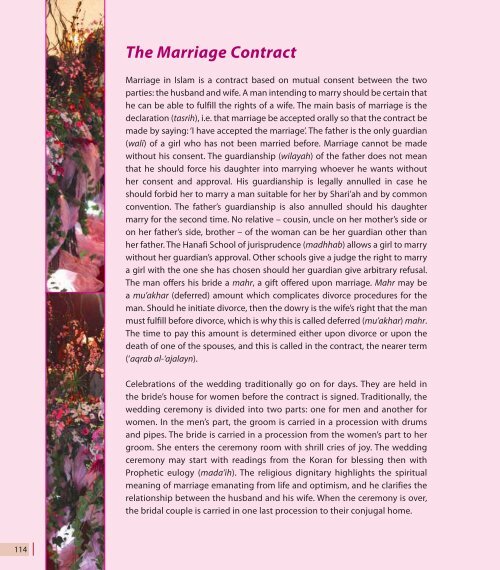Cultural aspects in Christian and Islamic religions - unesdoc - Unesco
Cultural aspects in Christian and Islamic religions - unesdoc - Unesco
Cultural aspects in Christian and Islamic religions - unesdoc - Unesco
You also want an ePaper? Increase the reach of your titles
YUMPU automatically turns print PDFs into web optimized ePapers that Google loves.
114<br />
The Marriage Contract<br />
Marriage <strong>in</strong> Islam is a contract based on mutual consent between the two<br />
parties: the husb<strong>and</strong> <strong>and</strong> wife. A man <strong>in</strong>tend<strong>in</strong>g to marry should be certa<strong>in</strong> that<br />
he can be able to fulfill the rights of a wife. The ma<strong>in</strong> basis of marriage is the<br />
declaration (tasrih), i.e. that marriage be accepted orally so that the contract be<br />
made by say<strong>in</strong>g: ‘I have accepted the marriage’. The father is the only guardian<br />
(wali) of a girl who has not been married before. Marriage cannot be made<br />
without his consent. The guardianship (wilayah) of the father does not mean<br />
that he should force his daughter <strong>in</strong>to marry<strong>in</strong>g whoever he wants without<br />
her consent <strong>and</strong> approval. His guardianship is legally annulled <strong>in</strong> case he<br />
should forbid her to marry a man suitable for her by Shari’ah <strong>and</strong> by common<br />
convention. The father’s guardianship is also annulled should his daughter<br />
marry for the second time. No relative – cous<strong>in</strong>, uncle on her mother’s side or<br />
on her father’s side, brother – of the woman can be her guardian other than<br />
her father. The Hanafi School of jurisprudence (madhhab) allows a girl to marry<br />
without her guardian’s approval. Other schools give a judge the right to marry<br />
a girl with the one she has chosen should her guardian give arbitrary refusal.<br />
The man offers his bride a mahr, a gift offered upon marriage. Mahr may be<br />
a mu’akhar (deferred) amount which complicates divorce procedures for the<br />
man. Should he <strong>in</strong>itiate divorce, then the dowry is the wife’s right that the man<br />
must fulfill before divorce, which is why this is called deferred (mu’akhar) mahr.<br />
The time to pay this amount is determ<strong>in</strong>ed either upon divorce or upon the<br />
death of one of the spouses, <strong>and</strong> this is called <strong>in</strong> the contract, the nearer term<br />
(‘aqrab al-‘ajalayn).<br />
Celebrations of the wedd<strong>in</strong>g traditionally go on for days. They are held <strong>in</strong><br />
the bride’s house for women before the contract is signed. Traditionally, the<br />
wedd<strong>in</strong>g ceremony is divided <strong>in</strong>to two parts: one for men <strong>and</strong> another for<br />
women. In the men’s part, the groom is carried <strong>in</strong> a procession with drums<br />
<strong>and</strong> pipes. The bride is carried <strong>in</strong> a procession from the women’s part to her<br />
groom. She enters the ceremony room with shrill cries of joy. The wedd<strong>in</strong>g<br />
ceremony may start with read<strong>in</strong>gs from the Koran for bless<strong>in</strong>g then with<br />
Prophetic eulogy (mada’ih). The religious dignitary highlights the spiritual<br />
mean<strong>in</strong>g of marriage emanat<strong>in</strong>g from life <strong>and</strong> optimism, <strong>and</strong> he clarifies the<br />
relationship between the husb<strong>and</strong> <strong>and</strong> his wife. When the ceremony is over,<br />
the bridal couple is carried <strong>in</strong> one last procession to their conjugal home.

















